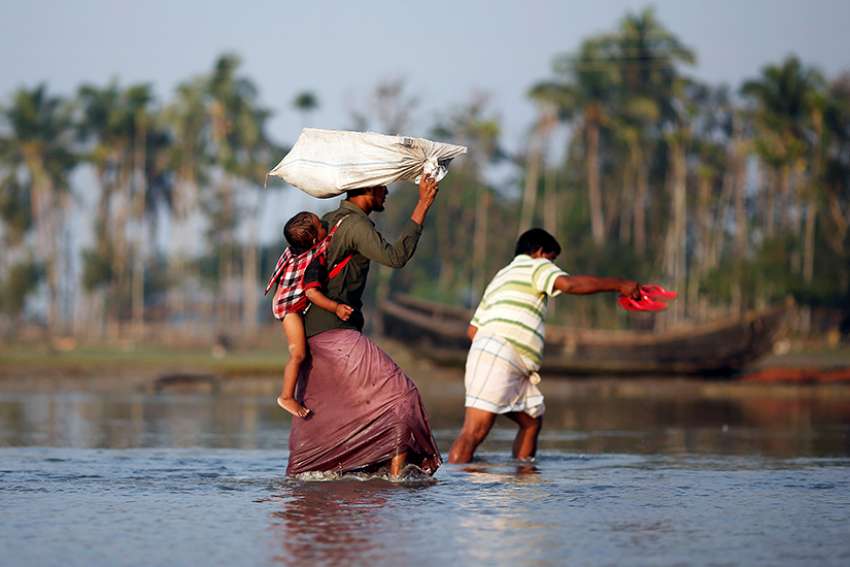A Rohingya refugee carries his son and belongings into Teknaf, Bangladesh, Oct. 25. The majority of the 600,000 refugees fleeing a military crackdown in Myanmar over the past two months have gone to Bangladesh, but some have traveled into India and Nepal.
CNS photo/Adnan Abidi, Reuters
Bishops fear any mention of Rohingya by Pope will bring 'chaos'
By Catholic News Service
YANGON, MYANMAR – When Pope Francis visits Myanmar in late November, Church leaders will be listening nervously to his every word, specifically hoping they don’t hear the R-word.
Any mention by name of the Rohingya, a Muslim group widely hated in this predominantly Buddhist country, will have widespread implications here.
“The Pope’s visit is keeping us very anxious, as many things can go wrong. A wrong word from the Holy Father can plunge the country into chaos,” said Fr. Mariano Soe Naing, communications director for Myanmar’s bishops.
“If the Holy Father in his speech evens mentions the Rohingya, the nationalist groups will respond. This is a historic problem, and we need a lot of time to solve this problem. We cannot just say this or that. That is the reason why Aung San Suu Kyi cannot say anything,” he said, referring to the de facto leader of Myanmar’s civilian government, who has been criticized internationally for failing to speak out against the military’s actions against Rohingya in northern Rakhine state.
Soe Naing said that while the bishops support democracy and back Suu Kyi, they understand her silence on the Rohingya.
“Aung San Suu Kyi has no right to comment on anything. The military has the authority to decide everything,” he said. “The whole world wants to criticize her, wants her to fight against the military in favour of full democracy. But that’s a fight she cannot win.”
The Asian church news agency ucanews.com reported the country’s Catholic bishops told the papal nuncio in June that they would prefer Pope Francis avoid mentioning the Rohingya by name.
More than a million Rohingya live in Myanmar, but they are widely seen by the government and the majority Buddhist population as foreigners.
On Aug. 25, Muslim separatists launched a series of attacks on government security forces in Rakhine. The Myanmar military launched a fierce counterattack. More than half a million Rohingya refugees have fled across the border into neighbouring Bangladesh, where UNICEF, in an Oct. 20 report, said conditions resemble “hell on earth,” particularly for refugee children.
Despite the caution urged by bishops, Pope Francis has mentioned the Rohingya by name.
“I would like to express all of my closeness to them,” he said Aug. 27, asking pilgrims at the Vatican to pray for “the Lord to save them, to raise up men and women of goodwill to help them, that they may be given full rights.”
Please support The Catholic Register
Unlike many media companies, The Catholic Register has never charged readers for access to the news and information on our website. We want to keep our award-winning journalism as widely available as possible. But we need your help.
For more than 125 years, The Register has been a trusted source of faith-based journalism. By making even a small donation you help ensure our future as an important voice in the Catholic Church. If you support the mission of Catholic journalism, please donate today. Thank you.
DONATE

